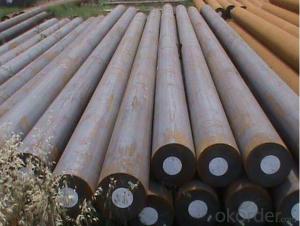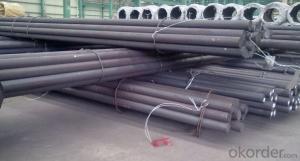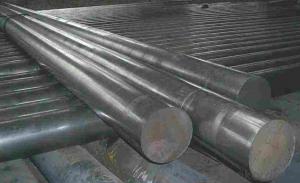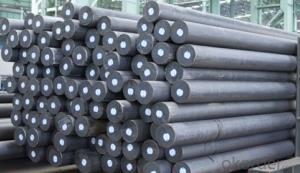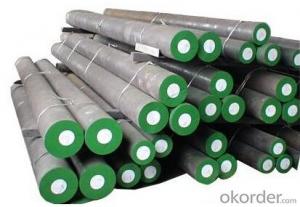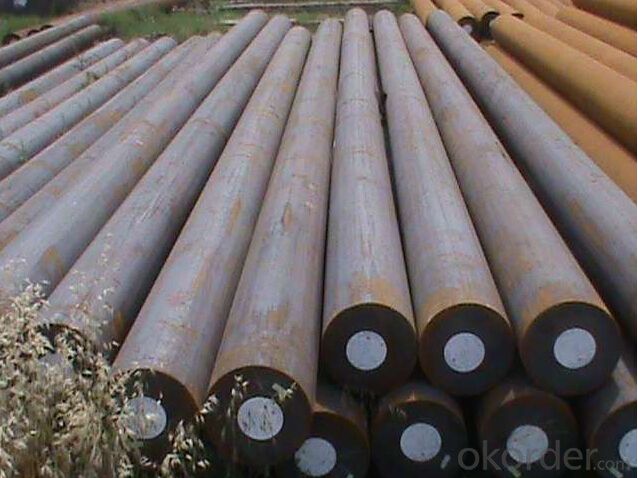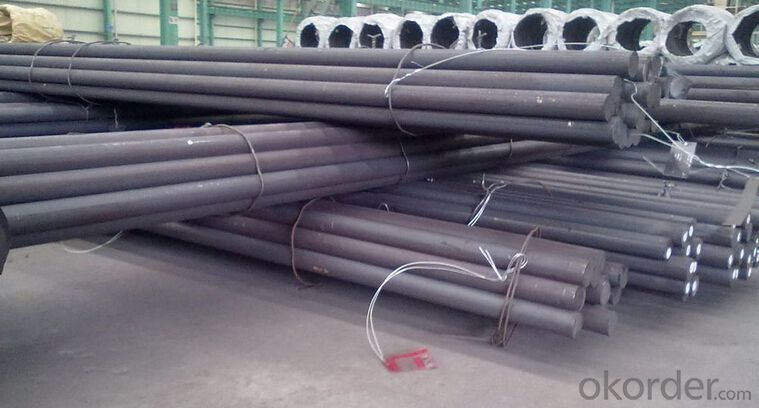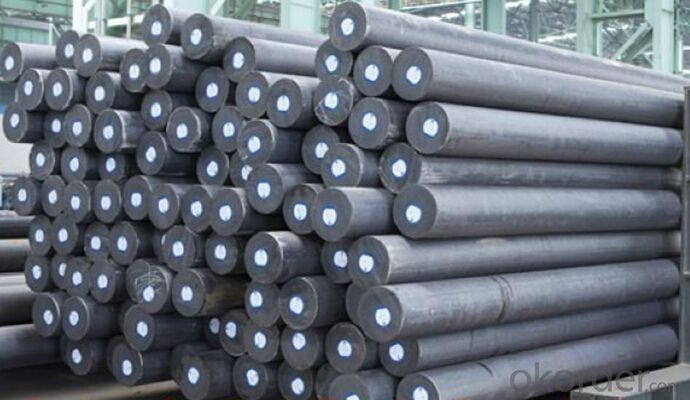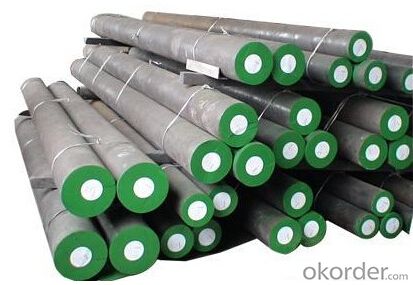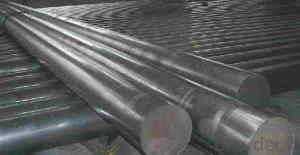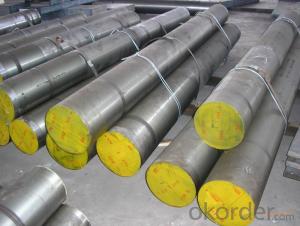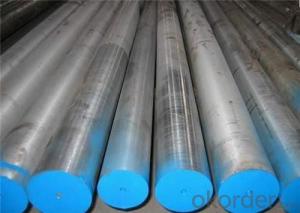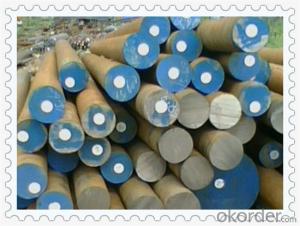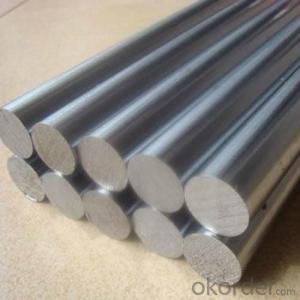Grade AISI52100/JIS52100 Bearing Steel Round Bar
- Loading Port:
- Shanghai
- Payment Terms:
- TT OR LC
- Min Order Qty:
- 30 m.t
- Supply Capability:
- 10000 m.t/month
OKorder Service Pledge
OKorder Financial Service
You Might Also Like
Specification
Specification of Round Bar
1, Dimention of 52100 Alloy Steel | ||||||||
Round bar | Diameter(mm) | Length (mm) | ||||||
20~800 | 3000~9000 | |||||||
Plate | Thickness(mm) | Width (mm) | Length (mm) | |||||
Max:800 | Max:2200 | Max:9000 | ||||||
The specification can be customized. | ||||||||
2, Chemical Compositions (%) | ||||||||
Grade | C | Si | Mn | P | S | Cr | Mo | Ni |
GCr15 | 0.95-1.05 | 0.15-0.35 | 0.25-0.45 | ≤0.025 | ≤0.025 | 1.40-1.65 | ≤0.10 | ≤0.30 |
E52100 | 0.93-1.05 | 0.15-0.35 | 0.25-0.45 | ≤0.025 | ≤0.015 | 1.35-1.60 | ≤0.10 | ≤0.25 |
SUJ2 | 0.95-1.10 | 0.15-0.35 | ≤0.50 | ≤0.025 | ≤0.025 | 1.30-1.60 | ≤0.08 | ≤0.25 |
100Cr6 | 0.93-1.05 | 0.15-0.35 | 0.25-0.45 | ≤0.025 | ≤0.015 | 1.35-1.60 | 0.1 |
|
3, Features of 52100 alloy steel | ||||||||
1, High carbon alloy steel | ||||||||
2, High degree of hardness | ||||||||
3, Good compressive strength and abrasion resistance | ||||||||
4, Typical Applications | ||||||||
1, Taps, gauges, swaging dies, ejector pins | ||||||||
2, Ball and roller bearings | ||||||||
3, Machine parts and for press tools | ||||||||
Our Featured Products
Alloy steel: Combination of steel / Bearing steel// Spring steel/ Cr- mo steel
GB 20Cr/ 40Cr / 42CrMo / 35CrMo/ 20CrMn/GCr15/30CrMnTi…
ASTM 5120 /5140 / 4140/ 4135/ 5152/52100…
JIS SCr420H/ SCr440/ SCM3/ SUP9/SUJ2…
Carbon steel: Carbon tool steel /Carbon Structural Steel
GB 20/ 35 /45/…
ASTM 1020/ 1030/1045…
JIS S20C/ S30C / S45C…
Usage and Applications of Round Bar
1. Chinese standard steel bar is often used where large amounts of steel need to be formed, for example as structural steel.
2. And we can use this kind of product on the performance of the mechanical parts if the demand is not very high.
3. Steel round bar is used in construction and a large number of architectural and engineering structures.
Packaging & Delivery of Round Bar
Packaging Detail: All goods are packed in bundle with steel strips and shipped by break bulk vessel or container (depend on target market and different ports)
Delivery Detail: 15~45 days
Trade terms: FOB, CFR, CIF
MOQ: 30 metric tons per specification; we can negotiate the quantity if the specification is normal or we have stock of one specification.
Weight: Theprice invoicing on theoretical weight basis or actual weight basis depends on customer’s request.
Shipment: The shipment of bulk break or container is depends on customer’s request and the situation of the port of destination.
Documents given: Full set of original clean on board bill of lading; Original signed commercial invoice; Original packing list; Policy of insurance; Certificate of origin and what the target market needs.
FAQ:
Q1: Why buy Materials & Equipment from OKorder.com?
A1: All products offered byOKorder.com are carefully selected from China's most reliable manufacturing enterprises. Through its ISO certifications, OKorder.com adheres to the highest standards and a commitment to supply chain safety and customer satisfaction.
Q2: How do we guarantee the quality of our products?
A2: We have established an advanced quality management system which conducts strict quality tests at every step, from raw materials to the final product. At the same time, we provide extensive follow-up service assurances as required.
Q3: How soon can we receive the product after purchase?
A3: Within three days of placing an order, we will begin production. The specific shipping date is dependent upon international and government factors, but is typically 7 to 10 workdays.
Q4: What makes stainless steel stainless?
A4: Stainless steel must contain at least 10.5 % chromium. It is this element that reacts with the oxygen in the air to form a complex chrome-oxide surface layer that is invisible but strong enough to prevent further oxygen from "staining" (rusting) the surface. Higher levels of chromium and the addition of other alloying elements such as nickel and molybdenum enhance this surface layer and improve the corrosion resistance of the stainless material.
Q5: Can stainless steel rust?
A5: Stainless does not "rust" as you think of regular steel rusting with a red oxide on the surface that flakes off. If you see red rust it is probably due to some iron particles that have contaminated the surface of the stainless steel and it is these iron particles that are rusting. Look at the source of the rusting and see if you can remove it from the surface.
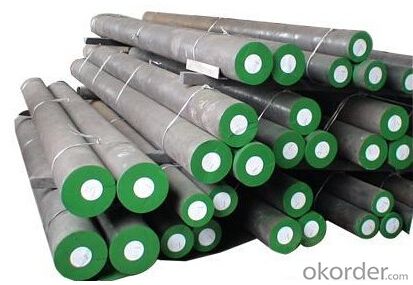
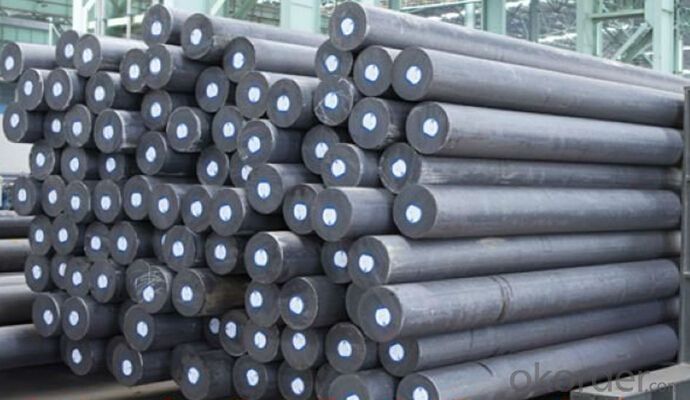
- Q: What are the applications of special steel in the aerospace sector?
- Special steel has various applications in the aerospace sector due to its exceptional properties. It is used for manufacturing critical components such as turbine blades, landing gear, and structural parts. The high strength, corrosion resistance, and heat resistance of special steel make it ideal for withstanding extreme conditions experienced during flight. Additionally, its lightweight nature contributes to fuel efficiency and overall performance improvement in aircraft.
- Q: How does special steel contribute to the manufacturing of medical implants?
- The unique properties and characteristics of special steel make it vital in the production of medical implants. These implants need materials that are durable, corrosion-resistant, and biocompatible. Stainless steel, titanium alloys, and cobalt-chromium alloys are special steels that possess these desired qualities, making them ideal for medical implant manufacturing. Stainless steel, for instance, is widely used in the production of medical implants due to its exceptional corrosion resistance and high strength. It finds applications in surgical instruments, orthopedic implants, and dental devices. Stainless steel implants can endure the harsh physiological conditions within the body, ensuring long-term performance and reducing the risk of complications. Titanium alloys, on the other hand, are extensively utilized in medical implant manufacturing. These alloys offer a high strength-to-weight ratio, excellent biocompatibility, and corrosion resistance. Orthopedic surgeries, including joint replacements, as well as dental implants, commonly employ titanium implants. The biocompatible nature of titanium allows for better integration with the surrounding bone, facilitating faster healing and reducing the risk of rejection. Cobalt-chromium alloys are also utilized in the production of medical implants. These alloys possess outstanding mechanical strength, wear resistance, and biocompatibility. Orthopedic surgeries and cardiovascular interventions, such as stents, often make use of cobalt-chromium implants. Their high strength ensures stability and durability, while their biocompatibility minimizes adverse reactions and aids in patient recovery. Overall, special steel provides the necessary qualities for manufacturing medical implants. Whether it is stainless steel, titanium alloys, or cobalt-chromium alloys, these materials contribute to the creation of biocompatible, corrosion-resistant, and durable implants that enhance patients' quality of life and ensure successful medical procedures.
- Q: What are the different methods of preventing intergranular corrosion in special steel?
- Various techniques are available for preventing intergranular corrosion in special steel. 1. Heat Treatment: A highly effective approach involves subjecting the steel to solution annealing, a heat treatment process. This method entails heating the steel to a high temperature and rapidly cooling it. By doing so, any precipitates or carbides that may have formed along the grain boundaries are dissolved, thereby reducing the risk of intergranular corrosion. 2. Alloying: Another strategy is to introduce specific alloying elements into the steel composition. For instance, the addition of elements such as chromium and molybdenum can enhance the steel's resistance to intergranular corrosion. These alloying elements create a protective oxide layer on the surface, preventing corrosion along the grain boundaries. 3. Passivation: Passivation involves treating the steel surface with chemicals that establish a protective layer. This layer acts as a barrier, safeguarding the grain boundaries from the corrosive environment. Common passivation techniques include acid pickling and electrochemical methods. 4. Sensitization Control: Particular attention must be given to controlling the sensitization process. Sensitization occurs when the steel is exposed to high temperatures for an extended period, resulting in the precipitation of chromium carbides along the grain boundaries and rendering the steel vulnerable to intergranular corrosion. By carefully controlling the heating and cooling rates during processing, sensitization can be minimized or prevented. 5. Corrosion Inhibitors: Another option is the utilization of corrosion inhibitors, which are chemicals that can be applied to the steel surface to protect it from corrosion. These inhibitors form a protective film on the surface, preventing corrosive agents from attacking the grain boundaries. It is important to consider that the choice of method depends on the specific type of special steel and its intended application. Selecting the most suitable approach requires a comprehensive understanding of the steel's composition, processing conditions, and the expected corrosive environment.
- Q: What is the role of special steel in sustainable manufacturing?
- Special steel plays a crucial role in sustainable manufacturing by offering enhanced durability, strength, and corrosion resistance, resulting in longer-lasting and more efficient products. It enables the development of lightweight yet robust components, reducing material consumption and energy consumption during production and usage. Additionally, special steel can be easily recycled, contributing to the circular economy and minimizing environmental impact.
- Q: How is high-strength stainless steel used in the production of structural components?
- High-strength stainless steel is used in the production of structural components due to its exceptional mechanical properties. Its high tensile strength, corrosion resistance, and durability make it an ideal material for constructing load-bearing parts such as beams, columns, and supports. Additionally, the stainless steel's ability to withstand harsh environments ensures the longevity and reliability of these structural components.
- Q: Can special steel be used in renewable energy applications?
- Yes, special steel can indeed be used in renewable energy applications. Special steel refers to high-performance alloys that possess specific properties such as high strength, corrosion resistance, and temperature resistance. These properties make special steel an excellent choice for various components used in renewable energy technologies. In wind energy, for example, special steel is used in the manufacturing of wind turbine components such as rotor shafts, gears, and bearings. The high strength and fatigue resistance of special steel ensure the durability and reliability of these components, allowing them to withstand harsh environmental conditions and prolonged use. Special steel is also utilized in solar power systems. Solar panels require sturdy and corrosion-resistant frames to support and protect the delicate photovoltaic cells. Special steel provides the necessary strength and resistance to weathering, ensuring the longevity of solar panels in outdoor installations. Furthermore, in hydropower applications, special steel is employed in the construction of turbines, penstocks, and other components that are exposed to high-pressure and corrosive environments. The excellent resistance to erosion, cavitation, and corrosion of special steel ensures the efficient and reliable operation of hydropower plants. Additionally, special steel finds applications in the manufacturing of batteries used in renewable energy storage systems. The high strength and thermal stability of special steel are crucial for the containment and protection of battery cells, ensuring their safe operation. In summary, special steel is well-suited for renewable energy applications due to its exceptional mechanical properties and resistance to corrosion and high temperatures. Its utilization in wind turbines, solar panels, hydropower systems, and energy storage technologies enhances the performance and reliability of these renewable energy solutions.
- Q: How does special steel perform in high-temperature corrosion resistance?
- Special steel is known for its excellent performance in high-temperature corrosion resistance. It is specifically designed to withstand harsh conditions and maintain its integrity even at elevated temperatures. The composition of special steel includes various alloying elements such as chromium, nickel, molybdenum, and others, which enhance its resistance to corrosion in high-temperature environments. At high temperatures, many materials tend to oxidize or react with the surrounding environment, leading to corrosion and degradation. However, special steel forms a protective oxide layer on its surface, which acts as a barrier against corrosive elements. This oxide layer, mainly composed of chromium, is stable and self-repairing, preventing further corrosion and maintaining the structural integrity of the steel. Furthermore, the addition of alloying elements like molybdenum improves the steel's resistance to pitting and crevice corrosion, which are common in high-temperature environments. Special steel also exhibits excellent mechanical properties even at elevated temperatures, ensuring its structural stability and preventing deformation or failure under stress. Additionally, special steel is often heat-treated to enhance its high-temperature corrosion resistance. Heat treatment processes like annealing, tempering, or quenching and tempering optimize the microstructure and mechanical properties of the steel, making it more resistant to corrosion in extreme conditions. Overall, special steel performs exceptionally well in high-temperature corrosion resistance due to its unique composition, protective oxide layer, and heat treatment processes. It is a reliable and durable material choice for applications that involve exposure to elevated temperatures and corrosive environments, such as in chemical processing plants, power generation facilities, or oil and gas refineries.
- Q: What are the main factors affecting the creep rupture strength of special steel?
- The main factors affecting the creep rupture strength of special steel can be categorized into several key parameters. 1. Temperature: Creep rupture strength is highly dependent on the temperature at which the steel is operating. Higher temperatures can significantly reduce the creep rupture strength of special steel due to the increased atomic diffusion and dislocation movement, leading to accelerated deformation and eventual failure. 2. Time: Creep rupture strength is also influenced by the time duration of the applied load. Creep is a time-dependent phenomenon, meaning that the longer the steel is subjected to stress, the more likely it is to experience rupture. The relationship between time and creep rupture strength is typically described by a power law equation, where longer durations result in lower rupture strength. 3. Stress Level: The applied stress level is a critical factor affecting creep rupture strength. Higher levels of stress can cause faster deformation and reduce the time to rupture. Therefore, it is important to ensure that the stress level applied to special steel is within the acceptable range to maintain its desired creep rupture strength. 4. Microstructure: The microstructure of special steel plays a crucial role in determining its creep rupture strength. Factors such as grain size, grain boundary characteristics, and the presence of alloying elements can all influence the steel's resistance to creep deformation and rupture. Fine-grained microstructures with a high density of grain boundaries tend to exhibit better creep resistance and higher rupture strength. 5. Composition: The chemical composition of special steel can significantly impact its creep rupture strength. The addition of certain alloying elements, such as chromium, molybdenum, and vanadium, can enhance the steel's high-temperature strength and resistance to creep deformation. These elements form stable carbides, which impede the movement of dislocations and improve the material's creep rupture strength. 6. Heat Treatment: The heat treatment process used to modify the microstructure of special steel can also affect its creep rupture strength. Proper heat treatment can optimize the grain size, distribution of alloying elements, and overall microstructure, resulting in improved creep resistance and higher rupture strength. Overall, the main factors affecting the creep rupture strength of special steel include temperature, time, stress level, microstructure, composition, and heat treatment. Understanding and controlling these parameters is crucial in ensuring the desired performance and reliability of special steel in high-temperature and long-term applications.
- Q: What are the applications of corrosion-resistant steel?
- Corrosion-resistant steel has a wide range of applications in various industries. It is commonly used in the construction of buildings, bridges, and infrastructure in coastal areas or places with high humidity, as it can withstand exposure to corrosive elements like saltwater and moisture. It is also utilized in the automotive and aerospace industries, where it provides durability and longevity to components exposed to harsh environments. Additionally, corrosion-resistant steel is extensively used in manufacturing equipment and storage tanks for chemicals, pharmaceuticals, and food processing, as it ensures the integrity and safety of these materials.
- Q: What are the specific requirements for special steel used in the oil and gas pipeline industry?
- The harsh operating conditions and the need for high performance and reliability dictate the specific requirements for special steel used in the oil and gas pipeline industry. Key requirements include excellent corrosion resistance to protect against degradation or failure due to corrosive elements. The steel must also have high tensile strength to withstand pressure and stress, ensuring structural integrity and preventing leaks or bursts. Additionally, the steel must exhibit toughness and impact resistance to maintain pipeline integrity and prevent accidents. It should also possess excellent low-temperature toughness to prevent brittle fracture in cold environments. Good weldability is necessary for easy construction and repair of pipelines, while resistance to hydrogen-induced cracking and sulfide stress cracking is crucial for pipeline safety. Compliance with industry standards and regulations ensures that the steel meets the necessary mechanical properties, chemical composition, and manufacturing processes required for safe operation. Overall, these requirements are essential for maintaining the integrity and safety of oil and gas pipelines.
Send your message to us
Grade AISI52100/JIS52100 Bearing Steel Round Bar
- Loading Port:
- Shanghai
- Payment Terms:
- TT OR LC
- Min Order Qty:
- 30 m.t
- Supply Capability:
- 10000 m.t/month
OKorder Service Pledge
OKorder Financial Service
Similar products
Hot products
Hot Searches
Related keywords
